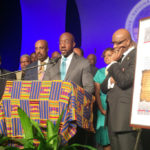We are sidling up to a tenuous and tepid Independence Day this year.
Independence for whom? Fireworks may fizzle over the heads of racial minorities across the South and selected areas elsewhere in the US of A.
 Editor Marv KnoxNine days prior to the Fourth of July, the U.S. Supreme Court crippled a key provision of the Voting Rights Act of 1965. This law stipulates states, cities and counties whose historical record indicates racial discrimination in their polling practices must receive prior approval from the attorney general or federal judges before changing how voters cast ballots. It applied to Texas and eight other states, mostly in the South, as well as parts of seven additional states.
Editor Marv KnoxNine days prior to the Fourth of July, the U.S. Supreme Court crippled a key provision of the Voting Rights Act of 1965. This law stipulates states, cities and counties whose historical record indicates racial discrimination in their polling practices must receive prior approval from the attorney general or federal judges before changing how voters cast ballots. It applied to Texas and eight other states, mostly in the South, as well as parts of seven additional states.
Civil rights leaders and statesmen from both parties designed the Voting Rights Act to ensure all citizens receive a fair and equitable opportunity to vote. And understanding human nature, they wrote a provision specifically to prevent voter discrimination before it can occur.
The Supreme Court’s 5-4 decision did not overtly strike down that provision, which calls for federal oversight of state and local voting provisions. But it said Congress must come up with a new formula for how to apply the act. A sharply divided Congress is unlikely to draft nonpartisan consensus guidelines for anything as vital as the political parties’ futures.
Chief Justice John Roberts, who joined the other four conservative justices in undermining the key feature of the Voting Rights Act, explained: “Our country has changed. And while any racial discrimination in voting is too much, Congress must ensure that the legislation it passes to remedy that problem speaks to current conditions.”
Resurging racism
Roberts probably believes what he said. Millions of Americans no doubt believed it, too—four and a half years ago, when our nation elected its first African-American president. But that step forward set off insidious and then resurging racism that seemed to turn back the clock of progress. It strains our national psyche and threatens our future.
If you think the United States has “changed” so we need fewer protections for civil rights, think again. Study the congressional redistricting actions of the Texas Legislature during the past two decades. Read the comment sections of news websites—whatever their political leanings—and note the racial animosity and distrust. Ask your friends of color, if you have them, if we’re a state or nation of racial equality and accord.
Sign up for our weekly edition and get all our headlines in your inbox on Thursdays
Racial equality—of which the right to vote is one leading indicator—should matter to serious Christians because of principle and pragmatism.
Principles from the Bible
We take our principles from the Bible, where concern for minorities and the vulnerable abound. In the Old Testament, followers of God are instructed to care for the weak and powerless, such as widows, orphans and aliens. Later, the prophets pronounced God’s judgment when the people failed to live up to those direct and straightforward standards. In the New Testament, Jesus said people will be judged by how we treat the “least” in society. The Apostle Paul insisted distinctions that differentiate us are of no account.
If we’re true to the dictates of our faith, we will work and struggle and sacrifice to ensure the rights of all people are protected. Baptists, of all citizens, should understand and affirm minority rights. For much of our history, we were a persecuted minority. Sadly, we often seem to apply the same what’s-in-it-for-me calculus as our neighbors, helping to elect demagogues who divide people for political gain and deny others’ rights for their own power.
Common sense
We should learn pragmatism from basic observation and common sense. The weakest societies are the divided cultures—the places where only the upper and lower classes exist, where the powerful oppress the weak. In those societies, the wealth and strength of the rich and powerful inevitably are short-lived, because the overall infrastructure fails.
Domestically, a state or region cannot expect to be vibrant if it does not provide education, secure wellness and offer a path of progress for its weakest citizens. In recent decades, plenty of Texans have traveled through Southern states and thanked God we didn’t have their problems—illiteracy, teen pregnancy, diabetes and other scourges. Now, we’re racing them down the dead-end street of poverty and toward the grossest immorality, disregard for fellow human beings.
Our state and nation cannot be significantly stronger than our weakest residents. The Supreme Court doesn’t get it. Will we, before it’s too late?













We seek to connect God’s story and God’s people around the world. To learn more about God’s story, click here.
Send comments and feedback to Eric Black, our editor. For comments to be published, please specify “letter to the editor.” Maximum length for publication is 300 words.